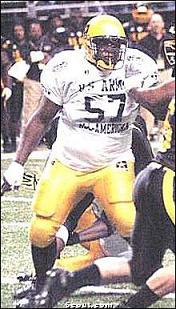 A couple of weeks ago, I discussed football phenom Jerrell Powe's victory in court against the University of Mississippi regarding his eligibility to play there. Sensitive to the recent University High School scandal and to related and myriad revelations of high school diploma mills, the NCAA had denied Powe's eligibility due to concerns about the legitimacy of his high school course work. Powe then secured a temporary restraining order against Ole Miss to enroll him.
A couple of weeks ago, I discussed football phenom Jerrell Powe's victory in court against the University of Mississippi regarding his eligibility to play there. Sensitive to the recent University High School scandal and to related and myriad revelations of high school diploma mills, the NCAA had denied Powe's eligibility due to concerns about the legitimacy of his high school course work. Powe then secured a temporary restraining order against Ole Miss to enroll him.
But Powe won't be attending Ole Miss this fall, as two major developments occurred in the last 48 hours: 1) the NCAA unsurprisingly denied Powe's appeal for reconsideration of his course work; and, more surprisingly, 2) Powe has dropped his lawsuit against Ole Miss, stating: “Although my attorneys are convinced I have met NCAA requirements, and that we would win the lawsuit, I do not want to enter and attend Ole Miss under a cloud of controversy."
After Powe's judicial victory, some had expressed concerns that college admissions' officers would lose autonomy in their selection of students. Others believed that Powe would be unable to do college-level work, thus putting Ole Miss faculty members in potentially awkward positions to pass him. On the other hand, that concern hasn't stopped countless top schools from admitting athletes who were unprepared to be students there, so why pick on Powe now? I suspect the NCAA is feeling the heat from New York Times' exposés on diploma mills, as well as from on-going questions about the NCAA's "educational mission," and Powe might simply be in the wrong place at the wrong time.
So what will the nation's #1 defensive tackle prospect now do? Powe clearly needs to play somewhere, otherwise his skills might atrophy and given his considerable size (6'3, 360 pounds), undesired weight gain could be another concern.
The 19-year-old Powe won't be eligible for the NFL Draft until 2008--at least short of a successful challenge against the NFL's age eligibility rule. Yes, we know that a plaintiff would not win on such a claim in the Second Circuit, but we do not know how another Circuit would rule on it. It should be noted that the NFL's age eligibility rule is now an express part of the league's CBA with the NFLPA, although a rule that precludes non-employees from applying for employment could be deemed to not concern a mandatory subject of collective bargaining, and this rule clearly does not primarily concern the rights of any NFL players or draftees; rather, it primarily concerns those individuals who, because of it, cannot become NFL players or draftees (see the Case Western Reserve Law Review article that sports agent Joe Rosen and I are publishing, or this blog's recent post on O.J. Mayo and Bill Walker that has some great comments, especially by Rick Karcher and PK). So the issue is not entirely closed, as some would hope.
A less controversial option for Powe would be to take high school level classes this fall and improve his academic standing so that, with NCAA approval, Ole Miss could admit him for the spring 2007 semester. He wouldn't be eligible to play football until the 2007-08 season, but he could work out with the team in that spring semester. He could also try a similar strategy to gain acceptance into rival schools, like Auburn or Alabama. Powe could accomplish the same immediate academic goals at a junior college, where he could also play football, albeit against inferior competition.
Another possibility for Powe would be to play in the Canadian Football League, which does not have the NFL's age eligibility rule. He wouldn't have to sue the NFL or wait for someone else to sue the NFL, and he wouldn't have to take any more classes, although he would have to move to Canada, a lovely country, but a far away place from Powe's hometown of Waynesboro, Mississippi. We shall see.





0 comments:
Post a Comment